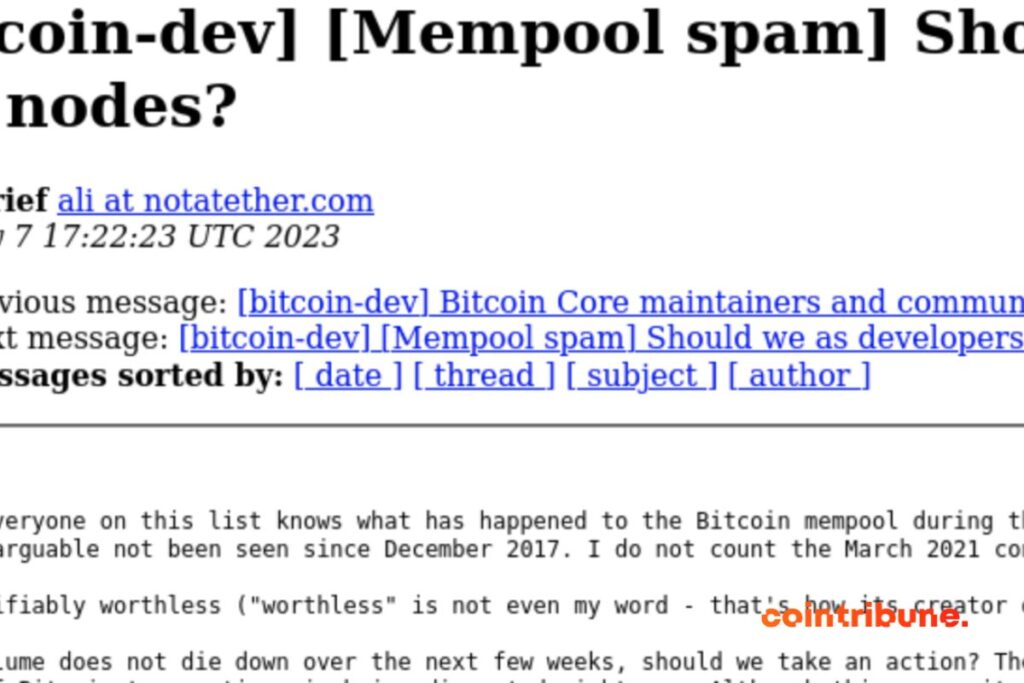I stopped by @PBDsPodcast this morning to discuss currencies, crypto, politics, #bitcoin, banking, macro, money, and the media with @patrickbetdavid. https://t.co/IctlB4l7gN pic.twitter.com/e6ljbGM124
— Michael Saylor⚡️ (@saylor) May 9, 2023
A
A
BRC-20 causes two Bitcoin core developers to lose patience
Thu 11 May 2023 ▪
6
min read ▪ by
Getting informed
▪
Mining
Two Bitcoin developers are stepping up to the plate to criticize the increased transaction fees caused by BRC-20.

BRC-20 and the increase in transaction fees
BRC-20 is currently causing an explosion in transaction fees. Basically, BRC-20 allows the creation of tokens (shitcoins). This is thanks to the equally recent Ordinal protocol, a recently popularized term for JPEGs inserted via “inscriptions” into BTC transaction blocks.
Entries are arbitrary data (like a JPEG) lodged in a bitcoin transaction. This has been possible since the Taproot update.
Ordinal made headlines a few weeks back. Thousands of transactions containing JPEGs suddenly piled up in the mempool, but without really causing a serious increase in transaction fees.
The criticism of Ordinal at the time was more related to the increased amount of disk space needed to maintain a full node. This is a threat to decentralization. So is the increase in time needed to synchronize a node (downloading hundreds of GB).
The trend faded quickly, however, saving us from the confusion between Bitcoin and scams (NFT, shitcoins, etc.) in the popular consciousness. But Ordinal has mutated and some are now using it to generate BRC-20s.
Problem is, the transaction fees have skyrocketed this time. At the time of writing, you have to pay between 10 and 20 dollars to insert your transaction in the next block. Even Binance was forced to temporarily suspend withdrawals.
Many believe that this bad moment will be temporary. And that in the end, this slump in the mempool is advertising the Lightning Network while filling the pockets of miners.
Even Michael Saylor, usually a stickler for ethics, is magnanimous, seeing this as another catalyst for bitcoin’s appreciation:
“We’re seeing a migration of developers from other cryptocurrencies to Bitcoin.”
Less philosophical, Max Keiser believes that “Ordinals are digital plastic-pollution floating in the ocean. Humans are great at polluting the environment, both analog and digital.”
Africans lose patience
The joke has gone on long enough for Anita Posch, bitcoin educator and founder of Bitcoin for Fairness:
“Can anyone explain how I’m going to onboard people with these fees?” she tweeted. “I’m mostly onboarding people in Africa. They don’t have the privilege like you to pay these high fees. They really need BTC, while you’re just playing around.”
Two Bitcoin Core devs have also lost patience, most notably Ethiopian Ali Sherief
“Due to side projects such as BRC-20 having such a high volume, real bitcoin transactions are being priced out and that is what is causing the massive congestion that has arguable not been seen since December 2017. I do not count the March 2021 congestion because that was only with 1-5sat/vbyte.
Such justifiably worthless (“worthless” is not even my word – that’s how its creator described them) tokens threaten the smooth and normal use of the Bitcoin network as a peer-to-pear digital currency, as it was intended to be used as.
If the volume does not die down over the next few weeks, should we take an action? The bitcoin network is a triumvirate of developers, miners, and users. Considering that miners are largely the entities at fault for allowing the system to be abused like this, the harmony of Bitcoin transactions is being disrupted right now. Although this community has a strong history of not putting its fingers into pies unless absolutely necessary – an example being during the block size wars and Segwit – should similar action be taken now, in the form of i) BIPs and/or ii) commits into the Bitcoin Core codebase, to curtail the loophole in BIP 342 (which defines the validation rules for Taproot scripts) which has allowed these unintended consequences?
An alternative would be to enforce this “censorship” at the node level and introduce a run-time option to instantly prune all non-standard Taproot transactions. This will be easier to implement, but won’t hit the road until minimum next release.
I know that some people will have their criticisms about this, absolutists/libertarians/maximum-freedom advocates, which is fine, but we need to find a solution for this that fits everyone’s common ground. We indirectly allowed this to happen, which previously wasn’t possible before. So we also have a responsibility to do something. To ensure that this kind of congestion can never happen again using Taproot.”
To which developer Luke Dashjr responded:
“Action should have been taken months ago,” Luke Dashjr wrote on Monday. “Spam filtration has been a standard part of Bitcoin Core since day one. It’s a mistake that the existing filters weren’t extended to Taproot transactions. Since this is a bug fix, it doesn’t really even need to wait for a major release.”
Useless things usually fizzle out. This was the case for NFT. And it will be the same for ordinals if its only use case is to pollute nodes with JPEGs and create pepecoins.
Scammers are already trying to build a Ponzi mayonnaise. Which is not a big deal if it is short-lived. On the other hand, let’s not forget that malicious entities could use these flaws to attack Bitcoin at little cost…
Maximize your Cointribune experience with our "Read to Earn" program! For every article you read, earn points and access exclusive rewards. Sign up now and start earning benefits.
A
A
The Cointribune editorial team unites its voices to address topics related to cryptocurrencies, investment, the metaverse, and NFTs, while striving to answer your questions as best as possible.
DISCLAIMER
The views, thoughts, and opinions expressed in this article belong solely to the author, and should not be taken as investment advice. Do your own research before taking any investment decisions.